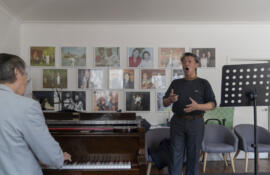‘The human brain is a bit like porridge in a bowl – if you shake it around it wobbles. If you hit it, it rotates. Depending on the strength of the blow it can shear brain cells or stretch them like rubber bands. Years of punishment may give boxers dementia in later life.
I wanted to figure out risk factors for brain injuries and help boxers avoid them. I found that sparring is a bigger risk factor than the fights themselves. It doesn’t matter whether you win or lose, or whether you’re knocked out or not, sparring causes short-term changes in brain function.
It might seem counterintuitive but boxers spend longer sparring than actually fighting. They spar for five or six weeks leading up to each fight, so for hours and hours they’re going for head blows and receiving them. Compare that with the one or two fights that most boxers have every year, which might only go for 20 minutes or half an hour. The longer boxers spar — and the more intensively — the more their reaction time is affected.
The bottom line is that your brain needs anywhere between seven and 15 days to recover after sparring or fighting.
To get data on this I had to become part of the furniture in the boxing world. For nearly two years I measured boxers’ reaction times in gyms and after fights on the weekend until one or two in the morning.
I remember the first guy I tested. He’d won, and all his mates came in. There was all this fracas and celebration, and I was just standing back thinking how the hell am I going to get this data? Eventually the fighter said: “Alright guys, fuck off, I’m gonna do my brain test.” That gave me confidence to keep going.

These guys understood the value of the research. They see that boxing is time-limited – that they do have a future. And it’s got to be in something else where they have to have a brain that works. One young guy, a panel beater who wants to have his own business one day, said to me “I’ve gotta have a life after boxing!”
The bottom line is that your brain needs anywhere between seven and 15 days to recover after sparring or fighting. If you go back to sparring before the brain is recovered it might take less punishment to be knocked out or injured.
There aren’t any rules about this, but I hope that my study will help to put some in place. The World Boxing Council (WBC) heard about the research while I was doing it and invited me to join their Medical Advisory Board. Now we have agreed that doctors all over the world will collect more data to test my conclusions. The WBC is well-respected, so if it tells its boxers that they aren’t allowed to spar for a period after a fight, it could have an impact.
Boxers and trainers need to recognise that it’s in their interest in the long term. They have to stay out of the ring to stay in.’
Helen Clausen’s PhD, completed last year, is titled:’Acute neurocognitive impairment in professional boxing’.
* “My PhD” is an irregular series in which The Citizen speaks with recent Melbourne University PhD graduates.


